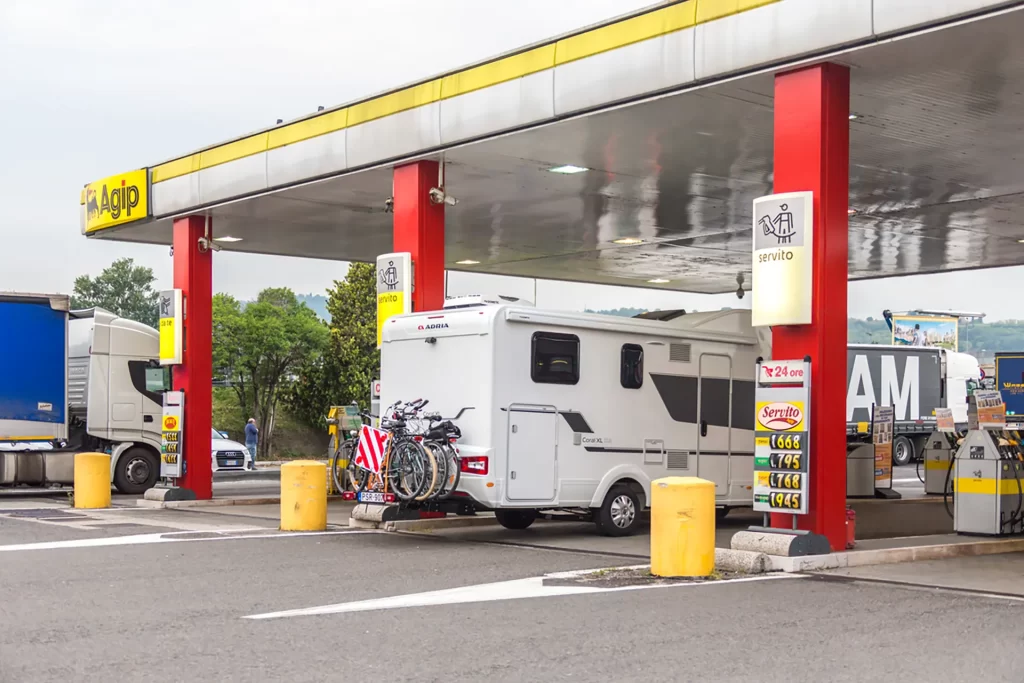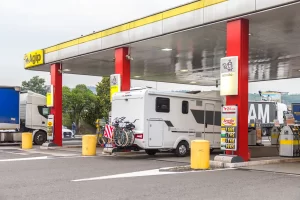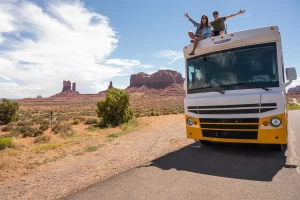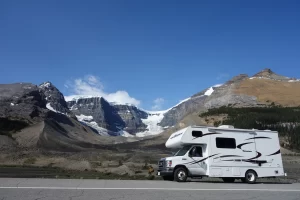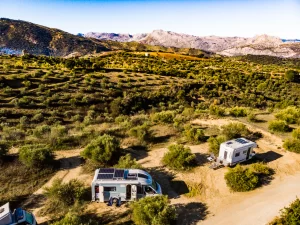RV travel sometimes gets a bad rap for not being eco-friendly. The major culprit is gas mileage. Extracting and burning fossil fuels causes pollution and big rigs use a lot of fuel. But that’s not fair. RV living is eco-friendly in many ways, and you can make some adjustments to make it even more environmentally sustainable.
As RVers, you value all the natural world has to offer. As such, the RV community is deeply invested in protecting the environment and adopting eco-friendly, sustainable practices and vehicles. We’re here to help you learn what you can do and what the industry is offering to make RVing as eco-friendly as possible.
You’re already cutting out one of the major environmental impacts of trips and vacations simply by avoiding air travel and its huge carbon footprint.
We’ll talk about the other aspects of eco-friendly RV travel after we address the elephant in the room: the gas tank.
Reduce the Gas Guzzling
Let’s start with that whole gas mileage thing. There’s no way, short of a huge new fleet of affordable electric RVs, that you can avoid filling your gas tank. A big part of the joy for a lot of RV travelers is driving the highways and backroads.
But there are ways to cut down the frequency of your stops at the pump. Doing so is good for the environment and good for your wallet. The first step is keeping up with your RV maintenance.
We know, we talk about RV maintenance a lot. We do that because it’s important. Following a good maintenance schedule cuts down on RV repairs (saving you money) and keeps all of your components running as efficiently as possible. Also, check your tire pressure frequently. That small bit of DIY maintenance can add up to savings at the pump.
A well-maintained RV runs better, uses less fuel, and is far less likely to ruin your vacation with break-downs.
We have technology in our hands that can also help you save fuel. Check your weather app and try to avoid traveling in high winds. Avoid this anyway, especially if you have a big Class A RV. It’s hard to stay safe on a windy road in a big vehicle.
High winds make your RV work harder and use more gas. The same goes for having a lead foot. Go a little slower, be a little safer, and make your fuel last longer. If the weather is nice, roll down your windows instead of using the air conditioning. That A/C is a fuel hog.
While you have your phone out, do some good trip planning. Unless you’re meandering along Route 66 or another scenic highway, take the shortest route to get where you’re going.
Good planning also helps you avoid other fuel burners: getting lost and sitting in traffic jams. If you have to travel through an area with dense traffic, try and do so at the times of day when traffic is lightest. If you can avoid those areas altogether without adding excess miles to your trip, that’s even better.
The main reason your RV eats so much fuel is because it’s heavy. The heavier your vehicle or trailer, the worse your mileage will be. Just because your vehicle can hold a lot doesn’t mean it has to hold a lot on every trip.
Lighten that load and you’ll reduce your tailpipe emissions and save money on gas.
Ways to Make Your RV Lighter
- Consider your trip. Are you using those winter boots, that rooftop storage rack, or your uncle’s cast iron skillet on this vacation? No? Leave them in the garage.
- Upgrade your RV with lighter furniture and fixtures. Older RVs may have heavy recliners. Choosing new furniture with aluminum frames updates your interior and gets rid of a lot of weight. Consider combining solid wood elements with lighter-weight materials.
- While you’re upgrading, think about a new mattress. If your mattress is old, you can probably find a new one you love that weighs a lot less.
- Cut down on food and water. WHAT? Seriously, if you’re going to a campground with water hookups, you may not need to completely fill your tanks. If there is a nearby grocery store, you can pick up the food you need when you arrive.
- Get rid of your generator. We’ll talk more about this later, but those things are heavy.
- Reconsider towing a vehicle. Sometimes you can bring bikes instead of towing a car. It depends on your RV lifestyle and your destination, but at least give it a thought!
You can continue to save on gas after you arrive at your destination. Stay in one place longer. Use campground or public transportation to get to attractions and amenities. If you’re camping with friends, carpool to off-site destinations.
Some of these fuel-savers seem like a hassle, we know. But your wallet and the planet will thank you for the effort. And once you get used to them, you’ll wonder why you were using so much extra gas!
Choose Your Fighter
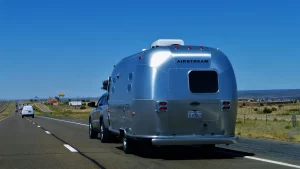
If you’re in the market for a new RV (or are just entering the RV community) choose a more eco-friendly vehicle.
Downsize
The simplest way to reduce your RV’s impact on the environment is to choose the smallest vehicle that suits your needs. Smaller vehicles use less fuel. Take a good look at which amenities you use when you camp. If you have amenities on your RV that go unused, the next time you buy, consider something smaller.
Try a Class C motorhome with high-quality power awnings to expand your living space to the outdoors. You may discover that you don’t miss the extra bulk of a Class A coach. The most eco-friendly choice is a campervan or Class B RV. These small, light vehicles are great for short trips and adventurous souls who boondock or dry camp.
There are more things to consider than size when choosing the most eco-friendly RV. Have you ever considered the shape of your vehicle? An aerodynamic curved trailer like a classic Airstream can be up to 20% more efficient to tow.
Green RVs and TRA Certification
As eco-friendly sustainable living has become more popular in the RV community, manufacturers have stepped up their eco-game. You can now purchase a TRA-certified Green RV.
TRA Certification, Inc. is leading the way in eco-friendly RV travel, helping consumers choose the most sustainable vehicles possible. TRA Certification takes into consideration four major aspects of RV travel when certifying a vehicle:
- Energy Efficiency
- Resources
- Indoor Air Quality
- Water Efficiency
We’ve already talked a lot about what you can do to improve your RV’s fuel efficiency. When TRA talks about energy efficiency, they mean the components of your motorhome or travel trailer. Efficient heating and cooling systems, insulation, and LED lighting are just a few of the areas considered.
Resources, to TRA, are all about how an RV is built. This covers an extraordinary amount of ground. Everything from regionally sourced components to reusable shipping containers and the installation of rain drainage systems impacts a vehicle’s resource usage.
Indoor air quality is an eco-friendly element that is often overlooked.
Chemicals, including formaldehyde, used in flooring, insulation, sealants, and more can off-gas into your vehicle, creating indoor air pollution. TRA-certified vehicle manufacturers are mindful of the materials they use as well as the ventilation systems they install.
Water efficiency includes elements like low-flow shower heads and faucets as well as instant water heaters and recycling/reusing water when appropriate. If you’re not averse to composting toilets, they add a lot of eco-power to your vehicle.
Buying an RV of any size – Class A, Class C, or Class B (campervans) – with a TRA Green RV Certification offers you peace of mind that you’re getting a vehicle that prioritizes sustainability and reduced environmental impact.
Tow Efficiently
We’re seeing more and more manufacturers come out with electric or hybrid cars and trucks. If you’re towing a trailer, consider upgrading your towing vehicle. With the dramatic increase in electric vehicles, charging stations are appearing all over the country. Be mindful when you plan your trip of the charging stations along your route. There are apps made specifically to guide you. For most people, this isn’t more work than knowing the distance to the next gas station.
Let the Sun Shine In
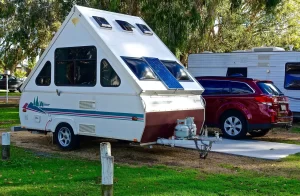
One of the most powerful ways to reduce your RV’s carbon footprint is to install solar panels so you can ditch your gas generator.
As we mentioned earlier, generators are heavy and reduce your fuel efficiency. They use even more fuel to run and create air and noise pollution in the process. Solar panels are much lighter, make no noise, and don’t leave anyone choking on fumes.
Even if you always camp at sites with electric hook-ups, solar panels are an excellent eco-saver. While much of the electricity in North America is still generated by coal-burning power plants, the less grid electricity you use the better.
Consider, too, that you may be paying extra for those hook-ups when you camp.
Where solar RV electricity is truly priceless is when you want to boondock or go off-grid. You can make use of many of your RV’s amenities without the weight, noise, or fumes from a generator.
Solar panels can be designed and fitted for almost any motorhome, trailer, or campervan. Some RVers use panels that are set up outside their vehicle and can be moved for maximum efficiency.
Custom RV upgrades including solar panels make your vehicle more eco-friendly and ultimately save you money on electricity and fuel. You don’t have to buy a new RV to become a more eco-friendly traveler!
Considerate Camping
The considerate camper is also an eco-friendly camper. These are things you do already that are good for the environment and make you a welcome member of the RV community.
- Clean up. Pick up all of your trash and dispose of it appropriately.
- Recycle. If your campsite doesn’t have recycling bins, use your own and empty them at the nearest facility.
- Get a compost bin. You can usually find a facility on your route where you can empty your food waste and other compostables.
- Leave no trace—you know the drill! Leave your campsite as you found it (or better if you follow an inconsiderate camper). Manage your campfires carefully and do not to disturb local wildlife.
- Turn it off. Don’t use a generator unless you have to, turn off lights and electronics you aren’t using, and generally conserve your battery power.
Take the Credit
As a member of the RV community, you’re probably already practicing sustainable, eco-friendly living in many ways. Camping is inherently eco-friendly. Hiking, fishing, birdwatching, or relaxing in a hammock leaves nothing behind but clean air and a beautiful experience for the next visitor.
As we mentioned above, air travel has a massive carbon footprint. By leaving behind planes and hotels you remove yourself from a cycle of air pollution and a culture of waste. You’re mindful of your resources and use them wisely.
We can all be more eco-friendly. Sometimes it’s easy, other times it takes more effort. But we value our natural spaces and do what it takes to protect them for ourselves and generations to come.
As you plan your next RV trip, try a few new things, feel good about being eco-friendly, and maybe save some money in the process!
If you’re interested in eco-friendly RV upgrades, contact us at Leisure Coachworks. Our experienced team of skilled technicians will help you choose the sustainable options that fit best into your RV lifestyle.
